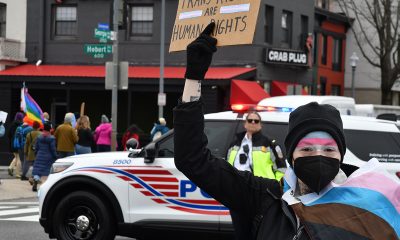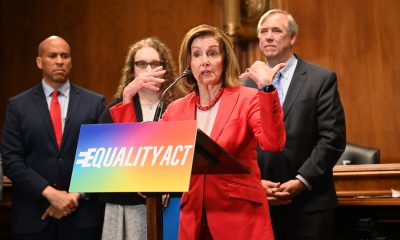National
11th hour anti-gay attacks against Cicilline?
R.I. GOP opponent stresses family, support for ‘Don’t Ask’
A gay politician seeking to represent Rhode Island in Congress is enduring what could be thinly veiled attacks on his sexual orientation as Election Day approaches.
David Cicilline, the gay mayor of Providence, R.I., is vying to represent the state’s 1st congressional district in the U.S. House. The seat is being vacated by retiring Rep. Patrick Kennedy (D-R.I.).
Cicilline, a Democrat, is running against Republican John Loughlin, a member of the Rhode Island State House and an Army veteran.
With Rhode Island’s unemployment rate currently at 11.5 percent — fifth highest in the nation — both candidates have been emphasizing job creation during the campaign.
But in the final weeks of the campaign, Loughlin has made several statements that could be considered digs at Cicilline based on his sexual orientation.
In a “Voice of the Candidate” clip that aired on a local NBC affiliate in Rhode Island, Loughlin repeatedly mentions that he is a father and a husband — possibly a reference to the fact that Cicilline is gay and single.
“I’ve been married for 23 years to my wife, Susan, and we have two daughters,” Loughlin says. “I know about the struggles of working families in Rhode Island because I’m part of one. I’ve had to worry about how to pay for dance lessons, summer camp and all the extras that come from raising children.’
Similar language about Loughlin’s family is included in one of the campaign’s recent radio ads promoting the candidate.
“John Loughlin is a husband, a father, a small businessman,” says a voiceover in the ad as somber trumpets play in the background.
Additionally, in a debate last week with Cicilline, Loughlin notably emphasized his support for “Don’t Ask, Don’t Tell.” The Republican candidate said the law “has served the military well” and he would “like to see it continue.”
Loughlin continued that the U.S. armed forces shouldn’t be a place to “celebrate” anyone’s sexual orientation and that “Don’t Ask, Don’t Tell” simply means “you cannot celebrate your sexuality while you are on active duty.”
“Mayor, I was there, I know, I served and I have seen it — you have not,” Loughlin said. “We are not interested in celebrating anyone’s sexuality; we are about doing the job.”
Eric Hyers, campaign manager for the Cicilline campaign, declined to comment on whether Loughlin’s statements amounted to anti-gay attacks and emphasized the Cicilline campaign is focused on bread-and-butter issues.
“David and his campaign are 100 percent focused on how to get Rhode Islanders back to work, how to make sure that we don’t privatize Social Security,” Hyers said. “We’re making sure that we fight to end tax breaks for companies that ship our jobs overseas.”
Loughlin’s campaign didn’t respond to the Blade’s request for comment on whether the Republican candidate’s statements were intended as anti-gay attacks against Cicilline.
One political observer, who spoke on the condition of anonymity, said “grasping at something” like a candidate’s sexual orientation is not uncommon in races where an opponent is behind.
“They think that if they grasp at David’s sexual orientation, that they might catch fire,” the observer said. “Could you try to interpret what Loughlin is doing as baiting? Probably. But I don’t think anybody’s really sensing that given how out David is.”
Last week, Politico included the race to represent Rhode Island’s 1st congressional district in the U.S. House as among its “99 Seats in Play” for the election. Cook Political Report last month changed the status of the race from “likely Democrat” to “leans Democrat.”
David Wasserman, House editor of the Cook Political Report, said Cicilline is waging “as good a race as he can” against Loughlin, but said socially conservative Democrats outside of Providence could side with the GOP candidates in the wake of the campaign attacks launched against the Providence mayor.
“Loughlin is gaining traction by pointing to Cicilline’s mayoral record,” Wasserman said. “Big city mayors often have a hard time turning an election into a referendum on their opponents when they have such a lengthy record to defend themselves.”
Larry Sabato, a political scientist at the University of Virginia, identified the Providence mayor as the “favorite” in the Rhode Island race and said the outcome of the contest would be “likely” Democratic. Even so, Sabato acknowledged that, “Republicans claim that the race has closed fast.”
But Hyers dismissed talk that Cicilline is in danger of losing the election, even as he acknowledged that the 2010 elections are “a tough environment for Democrats.”
“Fortunately for us, we’ve been running this campaign like we’re tied ever since it began,” Hyers said. “We’re taking nothing for granted we’ve seen what happens when Democrats take their foot off the gas. We’re not going to let that happen; we’re going that voters know everything there is to know about these two candidates.”
Cicilline is running in a Democratic stronghold and is credited for being a powerhouse fundraiser. He has raised nearly $1.7 million so far in his campaign while, in comparison, Loughlin has raised $618,000.
A poll made public earlier this month by NBC 10-Quest Research in Rhode Island also indicates that Cicilline is heading to victory. The poll found that Cicilline is leading Loughlin by 47 percent to 36 percent among likely voters.
Hyers said he thinks Cicilline’s prospects for winning are solid and said credible polls have the Providence mayor with a “solid lead — often times in double digits.”
“We have a phenomenal grassroots operation, a great ground game that’s started to turn out the voters … and the response at the doors is overwhelming,” Hyers said.
Compared to other non-incumbent openly gay congressional candidates, Cicilline is widely seen as having the best chance of winning on Election Day.
Steve Pougnet, the mayor of Palm Springs, Calif., is running in California’s 45th congressional district to unseat Rep. Mary Bono Mack (R-Calif.).
At the other end of the country, Ed Potosnak, a former staffer for Rep. Mike Honda (D-Calif.) and a public school teacher, is running in New Jersey’s 7th congressional against Rep. Leonard Lance (R-N.J.).
Both gay candidates are running under the Democratic banner in traditionally “red” districts against GOP incumbents at a time when major Republican gains are expected in Congress.
Sabato said Bono Mack is the “clear favorite” in the race against Pougnet, although he acknowledged California’s 45th congressional district is “in one of the weaker districts for a Republican this year.”
“Steve Pougnet would need a strong top-of-the-ticket coattail from [Democratic gubernatorial candidate] Jerry Brown and [U.S. Sen.] Barbara Boxer to win, and that is unlikely in this district,” Sabato added.
Despite these challenges, the political observer speaking on condition of anonymity said Pougnet has run an “equally good race” as Cicilline and has likewise been a fundraising powerhouse.
According to Federal Election Reports, Pougnet has been keeping up with Bono Mack, which is unusual because she’s an incumbent. Pougnet has raised nearly $1.7 million in the campaign while Bono Mack has raised $2.2 million.
“If you look at the last financial filings, you’ll be shocked at how similar they are in how much money they’ve raised,” the observer said.
Still, Pougnet has a tougher race than Cicilline because the Palm Springs mayor is challenging an incumbent.
“As time has shown, over and over again, running against an incumbent is that much more challenging, especially someone who’s been there as long as she has,” the observer said.
Potosnak’s race is seen as the toughest for an out gay candidate this year. Sabato said he has “no indication” he could put the Republican incumbent in “any electoral trouble.”
“We list that one as safe [Republican],” Sabato said. “This is not the year to upset secure Republican incumbents.”
U.S. Supreme Court
Supreme Court to consider bans on trans athletes in school sports
27 states have passed laws limiting participation in athletics programs

The U.S. Supreme Court on Thursday agreed to hear two cases involving transgender youth challenging bans prohibiting them from participating in school sports.
In Little v. Hecox, plaintiffs represented by the ACLU, Legal Voice, and the law firm Cooley are challenging Idaho’s 2020 ban, which requires sex testing to adjudicate questions of an athlete’s eligibility.
The 9th U.S. Circuit Court of Appeals described the process in a 2023 decision halting the policy’s enforcement pending an outcome in the litigation. The “sex dispute verification process, whereby any individual can ‘dispute’ the sex of any female student athlete in the state of Idaho,” the court wrote, would “require her to undergo intrusive medical procedures to verify her sex, including gynecological exams.”
In West Virginia v. B.P.J., Lambda Legal, the ACLU, the ACLU of West Virginia, and Cooley are representing a trans middle school student challenging the Mountain State’s 2021 ban on trans athletes.
The plaintiff was participating in cross country when the law was passed, taking puberty blockers that would have significantly reduced the chances that she could have a physiological advantage over cisgender peers.
“Like any other educational program, school athletic programs should be accessible for everyone regardless of their sex or transgender status,” said Joshua Block, senior counsel for the ACLU’s LGBTQ and HIV Project. “Trans kids play sports for the same reasons their peers do — to learn perseverance, dedication, teamwork, and to simply have fun with their friends,” Block said.
He added, “Categorically excluding kids from school sports just because they are transgender will only make our schools less safe and more hurtful places for all youth. We believe the lower courts were right to block these discriminatory laws, and we will continue to defend the freedom of all kids to play.”
“Our client just wants to play sports with her friends and peers,” said Lambda Legal Senior Counsel Tara Borelli. “Everyone understands the value of participating in team athletics, for fitness, leadership, socialization, and myriad other benefits.”
Borelli continued, “The U.S. Court of Appeals for the Fourth Circuit last April issued a thoughtful and thorough ruling allowing B.P.J. to continue participating in track events. That well-reasoned decision should stand the test of time, and we stand ready to defend it.”
Shortly after taking control of both legislative chambers, Republican members of Congress tried — unsuccessfully — to pass a national ban like those now enforced in 27 states since 2020.
Federal Government
UPenn erases Lia Thomas’s records as part of settlement with White House
University agreed to ban trans women from women’s sports teams

In a settlement with the Trump-Vance administration announced on Tuesday, the University of Pennsylvania will ban transgender athletes from competing and erase swimming records set by transgender former student Lia Thomas.
The U.S. Department of Education’s Office for Civil Rights found the university in violation of Title IX, the federal rights law barring sex based discrimination in educational institutions, by “permitting males to compete in women’s intercollegiate athletics and to occupy women-only intimate facilities.”
The statement issued by University of Pennsylvania President J. Larry Jameson highlighted how the law’s interpretation was changed substantially under President Donald Trump’s second term.
“The Department of Education OCR investigated the participation of one transgender athlete on the women’s swimming team three years ago, during the 2021-2022 swim season,” he wrote. “At that time, Penn was in compliance with NCAA eligibility rules and Title IX as then interpreted.”
Jameson continued, “Penn has always followed — and continues to follow — Title IX and the applicable policy of the NCAA regarding transgender athletes. NCAA eligibility rules changed in February 2025 with Executive Orders 14168 and 14201 and Penn will continue to adhere to these new rules.”
Writing that “we acknowledge that some student-athletes were disadvantaged by these rules” in place while Thomas was allowed to compete, the university president added, “We recognize this and will apologize to those who experienced a competitive disadvantage or experienced anxiety because of the policies in effect at the time.”
“Today’s resolution agreement with UPenn is yet another example of the Trump effect in action,” Education Secretary Linda McMahon said in a statement. “Thanks to the leadership of President Trump, UPenn has agreed both to apologize for its past Title IX violations and to ensure that women’s sports are protected at the university for future generations of female athletes.”
Under former President Joe Biden, the department’s Office of Civil Rights sought to protect against anti-LGBTQ discrimination in education, bringing investigations and enforcement actions in cases where school officials might, for example, require trans students to use restrooms and facilities consistent with their birth sex or fail to respond to peer harassment over their gender identity.
Much of the legal reasoning behind the Biden-Harris administration’s positions extended from the 2020 U.S. Supreme Court case Bostock v. Clayton County, which found that sex-based discrimination includes that which is based on sexual orientation or gender identity under Title VII rules covering employment practices.
The Trump-Vance administration last week put the state of California on notice that its trans athlete policies were, or once were, in violation of Title IX, which comes amid the ongoing battle with Maine over the same issue.
New York
Two teens shot steps from Stonewall Inn after NYC Pride parade
One of the victims remains in critical condition

On Sunday night, following the annual NYC Pride March, two girls were shot in Sheridan Square, feet away from the historic Stonewall Inn.
According to an NYPD report, the two girls, aged 16 and 17, were shot around 10:15 p.m. as Pride festivities began to wind down. The 16-year-old was struck in the head and, according to police sources, is said to be in critical condition, while the 17-year-old was said to be in stable condition.
The Washington Blade confirmed with the NYPD the details from the police reports and learned no arrests had been made as of noon Monday.
The shooting took place in the Greenwich Village neighborhood of Manhattan, mere feet away from the most famous gay bar in the city — if not the world — the Stonewall Inn. Earlier that day, hundreds of thousands of people marched down Christopher Street to celebrate 55 years of LGBTQ people standing up for their rights.
In June 1969, after police raided the Stonewall Inn, members of the LGBTQ community pushed back, sparking what became known as the Stonewall riots. Over the course of two days, LGBTQ New Yorkers protested the discriminatory policing of queer spaces across the city and mobilized to speak out — and throw bottles if need be — at officers attempting to suppress their existence.
The following year, LGBTQ people returned to the Stonewall Inn and marched through the same streets where queer New Yorkers had been arrested, marking the first “Gay Pride March” in history and declaring that LGBTQ people were not going anywhere.
New York State Assemblywoman Deborah Glick, whose district includes Greenwich Village, took to social media to comment on the shooting.
“After decades of peaceful Pride celebrations — this year gun fire and two people shot near the Stonewall Inn is a reminder that gun violence is everywhere,” the lesbian lawmaker said on X. “Guns are a problem despite the NRA BS.”


















